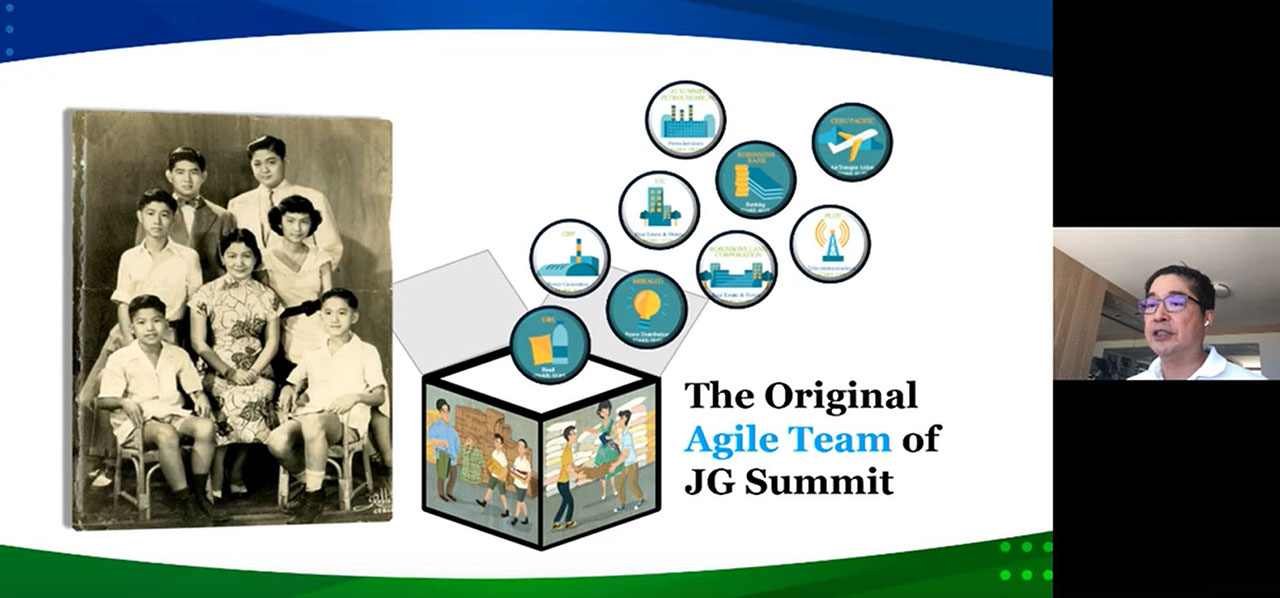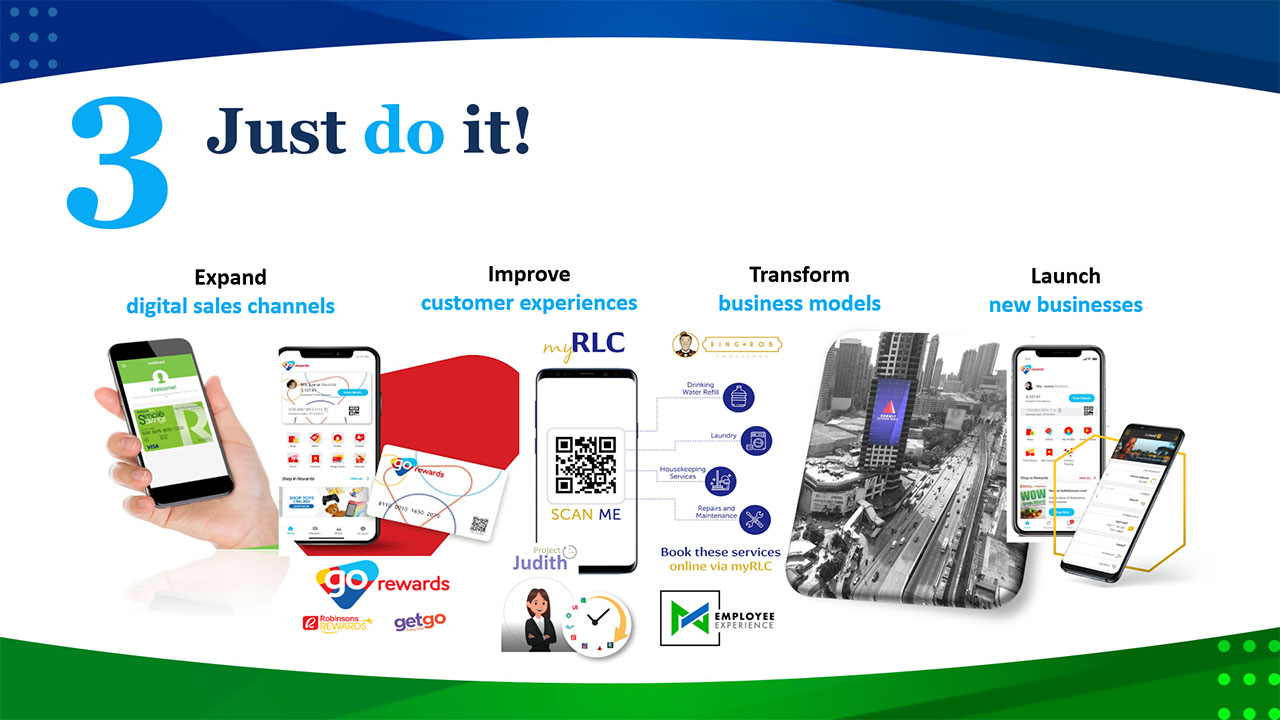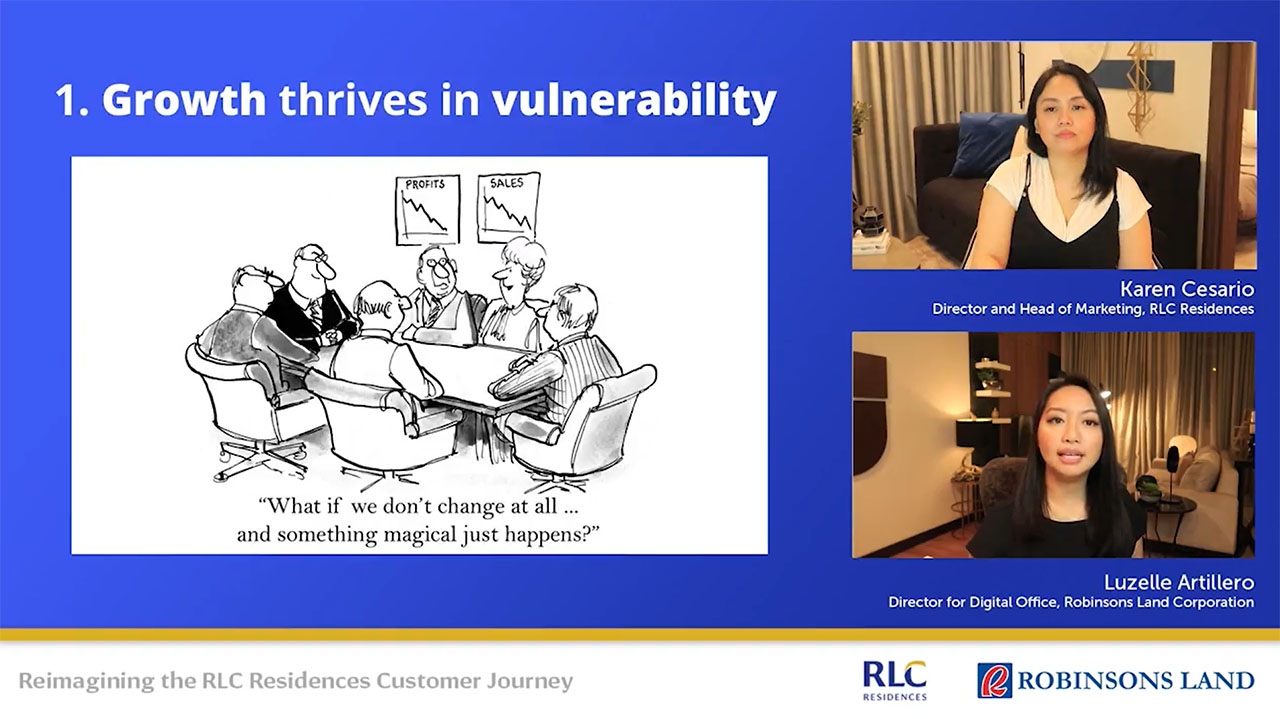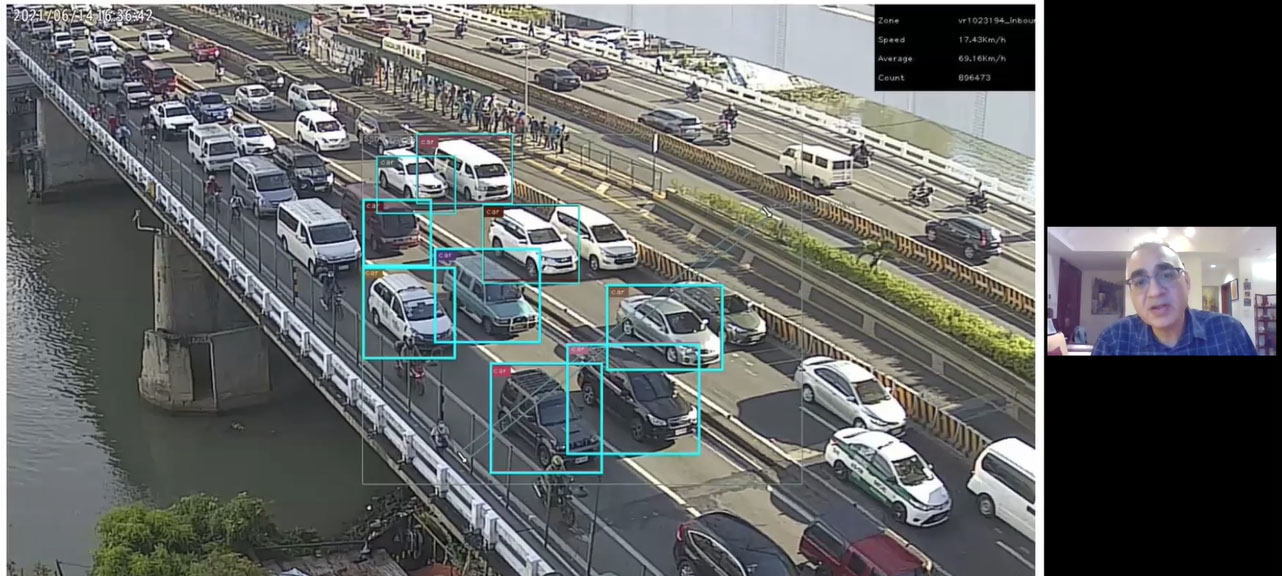Over the last few years, digital disruption has been brewing across various industries. Adding fuel to the fire was the COVID-19 pandemic, which made the adoption of new technology and new ways of working increasingly vital to coping with fast-shifting customer behavior. To show how these concepts are critical to the digital transformation taking place throughout the Gokongwei Group, the JG Summit Digital Transformation Office launched the inaugural Unbox Extra: the Gokongwei Group Innovation Festival on July 6, 2021.
Featuring 30 speakers from four continents, the groundbreaking virtual event had the theme “Thrive in the New Normal,” demonstrating how these exciting new business concepts, ideas, and innovations can be applied in the current business climate.

The debut edition of Unbox Extra featured 30 speakers from four continents. Among them were: (top row, from left) Hernan Carranza, chief innovation officer at Intercorp Group Peru; Rohit Mulani, founder and CEO at GoTrade; Candice Iyog, vice president for Marketing and Customer Experience at Cebu Pacific; Roland Ros and Rexy Dorado, co-founders of Kumu; (middle) Brian Cu, former head of Grab Philippines; Carla Yap-Sy Su, Data Analytics Ventures, Inc.’s head of Data and Innovation; Joerg Niessing, senior affiliate professor of marketing at INSEAD; Stephanie Sy, founder and CEO of Thinking Machines; (bottom) Priyanka Gill, co-founder and president of MyGlamm; Jennifer Teves, PhD, research director at Best Buy USA; Luis Cilimingras, partner at Ideo Munich; and Martin Gomez, COO and co-founder of Dashlabs.ai.
More than 5,000 employees and partners across the Gokongwei Group participated in the day-long online livestream session that featured plenary and breakout sessions that sought to capacitate members of the organization toward its transformational digital journey.
The sessions were categorized into five tracks. The plenary session focused on the hot topic of Digital Transformation, while the rest of the breakout sessions zeroed in on the pillars through which transformation is achieved: Agility, Customer-centricity, Data-Drivenness, and Emerging Technologies.
Lance Y. Gokongwei, president and CEO of JG Summit Holdings, set the inspirational tone for Unbox Extra in the event’s opening talk.
Presenting “The Gokongwei Group Digital Transformation Vision: Our Journey So Far,” Gokongwei said that the conglomerate’s transformation journey is very much in line with the spirit of innovation that is “embedded in our organization’s DNA.”
Through innovation, the company has remained relevant through the years, swiftly adapting to the changing times and with technology. The role of agility and customer-centricity since the earliest days of the family’s business was brought to the fore, as the late John Gokongwei Jr., JG Summit’s founder, and the rest of his siblings had their fingers firmly on the pulse of their customers and clients. They had a solid grasp of what people wanted, and then sold or developed products and services quickly to satisfy market demand.

These principles were applied as the family business grew, said Gokongwei, first at the flagship company, Universal Robina Corporation, then later at its other businesses.
Today, to keep up with the rapid technological advances that are disrupting traditional businesses as we know them, the Gokongwei Group would have to innovate in the digital sphere as well.
On its digital journey, the Gokongwei Group takes inspiration from global companies that have thrived through digital innovation, start-ups and big incumbent players alike. “Start-ups like Grab and Sea Limited, the parent company of Shopee, are able to address customer pain points through the innovative use of technology and have been able to scale very quickly,” says Gokongwei. He also pointed to the success of young regional players such as Gojek and Tokopedia (who have recently merged to form GoTo), Bukalapak, Lazada, Traveloka, and Grab.
On the opposite side of the spectrum, Gokongwei pointed out that Reliance Industries, an Indian conglomerate that has been around since the 1970s, has gone from strength to strength due to its embrace of digital transformation. Involved in many similar businesses to the Gokongwei Group – energy, petrochemicals, natural gas, retail, telecoms, and mass media – Reliance “has had a run up in value because of its digitalization strategy. In the last five years, its market capitalization has gone up by four times,” said Gokongwei.
Keeping his own conglomerate innovative, competitive, and relevant through digital transformation would be the “biggest challenge, and my biggest opportunity as well,” said Gokongwei.
He added that for the group to transform and continue to thrive, it would need to do the following:
- Leverage on the company’s strengths
- Develop digital experts
- “Just do it!”
- Learn from new ventures
According to the consulting firm McKinsey, the Gokongwei Group has an “unfair” advantage that it should maximize, referring to the group’s vast assets and ecosystem. These include the group’s good reputation in the industry, its portfolio of well-known brands, a wide customer base, its strong relationships with suppliers and vendors, its growing presence in the Philippines and Southeast Asia, and a strong and committed workforce that can be harnessed to maximize the ecosystem opportunities.
“How we leverage such valuable assets is the very key to our transformation. If we are able to apply the right technologies and new business models to real customer problems, and leverage our broad ecosystem to do it, we will be able to maximize our potential as a conglomerate,” said Gokongwei.
The group’s ecosystem is again called into play to develop digital experts, the second item on Gokongwei’s digital transformation list. He explained, “We need to build a corporate culture that is able to leverage on our Group’s ecosystem. In order for us to become digital experts, which are companies that are able to excel both in harnessing technology and transforming culture, we need to understand how to use new technologies and apply them to real customer problems.”

Building the required corporate culture can be achieved by adapting the so-called “new ways of working.” These include being agile, customer-centric, and data driven — three of the four digital transformation pillars that Unbox Extra provided deeper insight into.
Even business incumbents can benefit from the shift to these new ways of working. Through agile ways of working, URC has already reaped transformational benefits, such as marked improvements in its payment systems to suppliers, and the quicker development of new products that meet customer demands and expectations.
The third requisite of a successful transformation is for the conglomerate’s business units to learn how to develop products or services quickly, and then refine or improve them continuously over time, versus waiting for them to be perfected before launch. “Quick wins over perfection,” as Gokongwei described it. In other words, “just do it and show the way that digital transformation can be achieved in the Gokongwei Group in many ways.”
Gokongwei said that there are four types of digital projects, which he categorizes through “buckets.”
In the first bucket are projects that use digital apps to expand sales. In the Gokongwei Group, examples include Robinsons Bank’s Digital Banking App; Robinsons Retail’s e-commerce platform GoRobinsons; and Cebu Pacific’s online ticket sales platform.

Second are projects that use technology and the new ways of working to improve the customer experience, such as Robinsons Land’s homeowners’ portal, MyRLC, which has made condo living for RLC clients more convenient. Improving the customer experience applies to employees – a company’s internal customers – as well, as shown by JG Summit’s Employee Experience team. By seeking ways to simplify the fulfillment of employees’ HR concerns, they were able to create a user-friendly and highly efficient digital portal for the workforce.
Third are projects that use technology to transform business models. Gokongwei points to Summit Media, which transformed its traditional billboard business into an audience-led selling business by using cameras to see traffic situations per site and Internet of Things technology to measure footfalls, then aggregating these with third-party digital data. This enabled Summit Media to “develop advertising solutions for clients that are targeted, cost-efficient, and powerful.”

The fourth bucket includes projects designed to launch completely new businesses. Giving the audience a sneak peek into one of its newest businesses, Gokongwei spoke of how consumer data gathered by Data Analytics Ventures, Inc. combined with Robinsons Retail’s network of offline stores have made possible the development of a new digital bank that will cater to unbanked or underserved Filipinos.
Going back to the requirements of a successful digital transformation, Gokongwei stresses the importance of partnering with and learning from new ventures. By funding startups such as GrowSari, Kumu, Darwinbox, and others, the Gokongwei Group has been presented the opportunity to learn new business models, expand its spirit of innovation by learning about company cultures distinct from its own, and imbibe the dynamism, knowledge, and fresh perspective of these start ups’ founders.
Closing his talk, Gokongwei revealed his motivations for the digital journey, which was to stay true to the Gokongwei Group’s purpose: to have an unrelenting commitment to provide its customers with better choices, while creating shared success with all its stakeholders.
As Gokongwei said, “Digital transformation begins and ends with our customers at the very heart of the process.”


